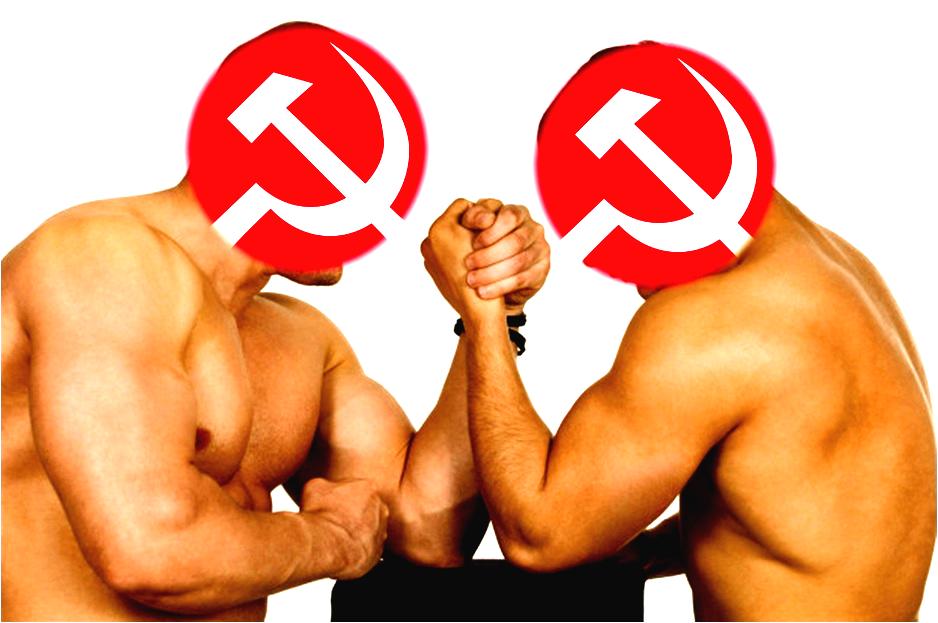Communism is a peculiar disease which spawns cannibalistic tendencies in the minds of the infected. Since the birth of communism, its history is riddled with murder, violence and manipulation both inside the communist vanguard and outside of it. Thus, people associated with it often turn on their own and possess an opportunistic mindset.
If we look back in history there have been several occasions where the lesser communists have been driven out or wiped out by the superior communists. Even the murderous rampage that saw Lenin’s Bolshevik’s assuming power by paths of brute force and a complete lack of respect for human lives, it was actually the same scenario where the Bolshevik’s over powering socialist revolutionary party even though the reds lost the first constituent assembly elections by a large margin to the SR party. SR won around 370 seats in a constituent assembly of 715 seats while the reds got only 175 seats. The reds raised chaos and the assembly was dissolved. Lenin himself in his earlier writings referred to this as the October Coup and not the now much more glamorized “October Revolution”.
So, it is not much of an eye opener that ideological descendants of this man and this ideology that has promoted violence and divisive resentment throughout its existence will be politically promiscuous and lacking a moral standpoint.
The Indian communists are far from what one expects them to be. Indian communism is a volatile mix of revisionism and Stalinistic approach with regard to regionalism thrown on top. From the very beginning, they have had an identity crisis within their political party and their leadership. With some of them wishing to follow Mao’s legacy and demolish the state apparatus and others unhappy with different aspects of the party position resulting in a divided house. As we all know that a house divided can’t stand but it seemed in independent India it stands and stands quite well until recently when it all came crashing down.
The vanguard of Indian communism is borne by two factions one being the “Bengal Brigade” where Communists ruled for 34 years and the other is Kerala which has managed to form government from time to time in that state. These two factions have decided the fate of the route of Indian communism since one can remember. The Bengal communists are represented by Sitaram Yechury and the Kerala faction is represented by Prakash Karat.
The main difference between these two factions is their experience with the Congress and the ability to win elections. The Bengal faction has mastered the art of winning election or so they thought, but since last few years their organization has been decimated and since the Bengali communists have been in power so long, they are willing to take any route available without any regard to the feasibility or the ideological divide. This has irked the Kerala faction, which after years of subjugation have gained an upper hand in the party.
The 22nd Party Congress provided the platform for this inner rift to be public. A delegate from Punjab accused the Kerala lobby, which backs Karat, of creating hindrance against the elected general secretary Yechury. The delegates from Assam and Maharashtra even demanded that the vote be a secret ballot one, usually any vote conducted in the Congress is by a show of hand. A secret ballot means that nobody will know who votes for whom. A representative from Kerala expressed his reservations about Yechury presenting his views on minority without consulting others (read Kerala faction) first.
The main issue of this rift is the prospect of an electoral alliance between the Congress and the Bengal communists in the coming Lok Sabha election of 2019.
Yechury tried to do some damage control by stating –
“There is no dispute over an electoral alliance with the Congress. There is no dispute in the priority that the BJP should be defeated. Each one of us knows that our priority is to get rid of the BJP-RSS government. The only difference is on how to achieve this target.”
The Kerala faction is concerned that by giving into this opportunistic tendencies of the Bengal camp will create trust issues in their state and force them into obscurity. Their assumptions are not entirely wrong. The last time Congress and CPI (M) went into an alliance the result was devastating loss for Bengal communists.
With its own party divided, the CPI (M) leadership it is highly unlikely that the communists will be able to play any significant role in the coming elections.
